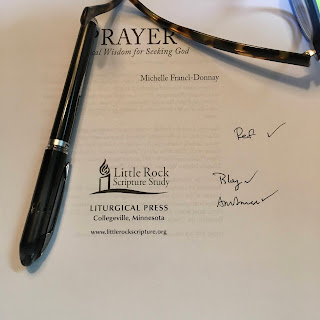Summer is closing in once again. Paradoxically, summer for me is the time that feels more closed-in than the bitter cold winter months. As the trees around my house in the neighborhood grow flush with leaves, I can no longer see more than the house next door peeping past the young oak and magnolia. The setting sun that blinded me in February barely limns the leaves come the end of the day. The bustle of students and colleagues who fill my days at the college is traded for time in my study at home or to sit on the back patio and read and write and think and rest, enfolded within the green canopy that encloses the house and the neighborhood.
Last summer I was writing a book about prayer, struggling with the notion that I might have anything of value to say about prayer. I'm neither Teresa of Avila nor Abba Joseph of the desert — all flame. But I took heart from a wise friend who suggested that it wasn't so much my competence that mattered here (for who can be competent in God), there could be someone more competent (who is this generation's Teresa?) but my willingness to show up and do the work did matter.
I showed up and did the work and yesterday got the final proofs. It's a short book, some 10,000 words or so, framed as a meditation on three scriptural passages: Psalm 63, Paul's exhortation to the Thessalonians to pray always and Luke's account of the Our Father. I tried to pull in a rich set of voices, to make up all I lack in expertise and authority, including Amma Syncletica's tart advice as well as the reflections of modern scholars such as André Chouraqui. The Spiritual Exercises get some space, as does the Catechism of the Catholic Church (which has some beautiful things to say about prayer even if you aren't Catholic.) And I do not fail to quote both St. Augustine as well as St. Ignatius of Loyola. There are pictures —of sere deserts and the incredible Sagrada Familia.
And it's all faithfully footnoted, a map of sorts to a pilgrimage through the practice of Christian prayer. I even provide the correct reference to the quote oft (and incorrectly) attributed to Teilhard de Chardin SJ: "Joy is the most infallible sign of the presence of God." You can find it in Léon Bloy's letters to his fiancée (Léon Bloy and Barbara Wald, trans. Letters to His Fiancée, Sheed & Ward, 1937, p 57.)






